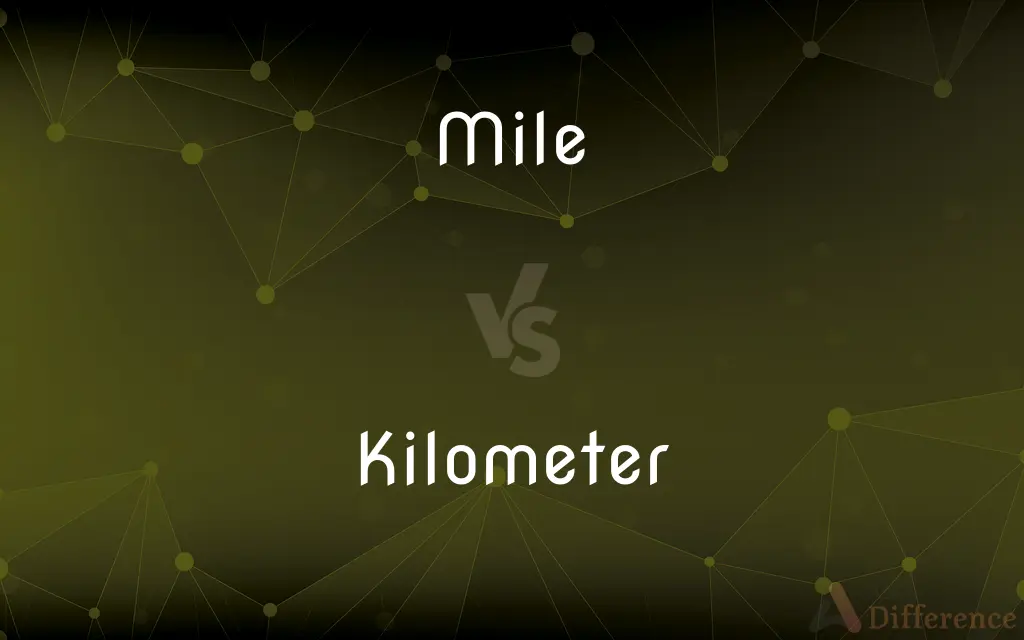Mile vs. Kilometer — What's the Difference?
By Tayyaba Rehman & Fiza Rafique — Updated on March 15, 2024
Miles are longer than kilometers, with 1 mile equaling approximately 1.609 kilometers. This distinction reflects the difference between the imperial and metric systems of measurement.

Difference Between Mile and Kilometer
Table of Contents
ADVERTISEMENT
Key Differences
The mile is a unit of length in the imperial system, primarily used in the United States, and is equal to 5,280 feet or about 1,609 meters. On the other hand, the kilometer, a unit of length in the metric system, is used in most other countries and is equivalent to 1,000 meters. This fundamental difference in base units reflects the divergent measurement systems each belongs to.
While the mile is commonly used in the United States for road distances, speed limits, and athletic events like marathons, the kilometer is the standard measurement for such applications in countries that use the metric system. This results in a clear distinction in how distances are conceptualized and communicated across different regions.
In terms of conversion, 1 mile is approximately equal to 1.609 kilometers, illustrating the mile's greater length. Conversely, 1 kilometer is equal to about 0.621 miles, which can be useful for converting distances between the two units.
The mile has its origins in Roman times, originally defined as a thousand paces or double steps. The kilometer, meanwhile, was introduced during the French Revolution as part of the metric system, designed for universality and ease of use, highlighting the historical and cultural differences in the development of measurement units.
Both units are used in various fields beyond just measuring distance, including in athletics, where races might be measured in miles or kilometers depending on the country, and in mapping and navigation, where they help in calculating distances between locations.
ADVERTISEMENT
Comparison Chart
System
Imperial
Metric
Length
5,280 feet or approximately 1,609 meters
1,000 meters
Usage
Predominantly in the U.S. for distances
Used worldwide except in the U.S.
Conversion
1 mile = 1.609 kilometers
1 kilometer = 0.621 miles
Historical Origin
Roman times, a thousand paces
French Revolution, metric system
Compare with Definitions
Mile
Also used in aviation and nautical settings.
The flight covered over 600 miles.
Kilometer
A primary unit of length in the metric system.
The park's loop is exactly 5 kilometers long.
Mile
In the imperial system, used for measuring distances.
The race was a grueling 26.2 miles long.
Kilometer
Created for simplicity and standardization.
The kilometer was adopted to simplify measurements.
Mile
Common unit for races and marathons.
The marathoner trained for the 5-mile race.
Kilometer
Essential in science, sports, and daily use.
The 10k run is a popular race distance.
Mile
Predominantly used in the United States for road distances and speed.
The speed limit is often posted in miles per hour.
Kilometer
Widely used worldwide for measuring distances.
Road signs outside the U.S. display distances in kilometers.
Mile
Originated from the Roman mille passus.
The concept of a mile has evolved from ancient measurements.
Kilometer
Equals 1,000 meters.
The nature reserve spans several thousand kilometers.
Mile
The mile, sometimes the international mile or statute mile to distinguish it from other miles, is a British imperial unit and US customary unit of distance; both are based on the older English unit of length equal to 5,280 English feet, or 1,760 yards. The statute mile was standardised between the British Commonwealth and the United States by the international agreement in 1959, when it was formally redefined with respect to SI units as exactly 1,609.344 metres.
Kilometer
A metric unit of length equal to 1,000 meters (0.62 mile). See Table at measurement.
Mile
A unit of linear measure equal to 1,760 yards (approximately 1.609 kilometres).
Kilometer
Alternative spelling of kilometre
Mile
A very long way or a very great amount
Vistas which stretch for miles
This is my favourite film by a mile
Kilometer
A measure of length, being a thousand meters. It is equal to 3,280.84 feet, or 0.62137119 of a mile.
Mile
By a great amount or a long way
The second tape is miles better
Kilometer
A metric unit of length equal to 1000 meters (or 0.621371 miles)
Mile
Abbr. mi. or mi A unit of length equal to 5,280 feet or 1,760 yards (1,609 meters), used in the United States and other English-speaking countries. Also called land mile, statute mile. See Table at measurement.
Mile
A nautical mile.
Mile
An air mile.
Mile
(Sports) A race that is one mile long.
Mile
A relatively great distance
Had to walk for miles in the airport.
Mile
The international mile: a unit of length precisely equal to 1.609344 kilometers established by treaty among Anglophone nations in 1959, divided into 5,280 feet or 1,760 yards.
Turn left in 1.2 miles.
Mile
Any of several customary units of length derived from the 1593 English statute mile of 8 furlongs, equivalent to 5,280 feet or 1,760 yards of various precise values.
Mile
Any of many customary units of length derived from the Roman mile (mille passus) of 8 stades or 5,000 Roman feet.
Mile
The Scandinavian mile: a unit of length precisely equal to 10 kilometers defined in 1889.
Mile
Any of many customary units of length from other measurement systems of roughly similar values, as the Chinese (里) or Arabic mile (al-mīl).
Mile
(travel) An airline mile in a frequent flyer program.
Mile
(informal) Any similarly large distance.
The shot missed by a mile.
Mile
(slang) A race of 1 mile's length; a race of around 1 mile's length (usually 1500 or 1600 meters)
The runners competed in the mile.
Mile
(slang) One mile per hour, as a measure of speed.
Five miles over the speed limit
Mile
A certain measure of distance, being equivalent in England and the United States to 320 poles or rods, or 5,280 feet.
Mile
A unit of length equal to 1760 yards
Mile
A unit of length used in navigation; equivalent to the distance spanned by one minute of arc in latitude; 1,852 meters
Mile
A large distance;
He missed by a mile
Mile
A former British unit of length once used in navigation; equivalent to 1828.8 meters (6000 feet)
Mile
A British unit of length equivalent to 1,853.18 meters (6,082 feet)
Mile
An ancient Roman unit of length equivalent to 1620 yards
Mile
A Swedish unit of length equivalent to 10 km
Mile
A footrace extending one mile;
He holds the record in the mile
Common Curiosities
Can you convert miles to kilometers easily?
Yes, by multiplying miles by 1.609, you can convert to kilometers; to convert kilometers to miles, multiply by 0.621.
Why does the U.S. use miles instead of kilometers?
The U.S. continues to use the imperial system, which includes miles, for historical and cultural reasons.
How do the imperial and metric systems differ?
The imperial system uses units like miles, feet, and inches, while the metric system uses meters and kilometers based on multiples of ten.
Is knowledge of both miles and kilometers important?
Understanding both is useful for travel, reading maps, and international communication.
What is the main difference between a mile and a kilometer?
A mile is longer than a kilometer, with 1 mile equaling approximately 1.609 kilometers.
What historical origins do miles and kilometers have?
The mile has Roman origins, defined as a thousand paces, while the kilometer was introduced with the metric system during the French Revolution.
How do education systems teach miles and kilometers?
In countries using the metric system, kilometers are emphasized, while the U.S. education system focuses on miles, often teaching both for completeness.
How do navigational systems handle miles and kilometers?
GPS and navigational systems can typically display distances in either miles or kilometers, based on user preferences.
What challenges arise from the coexistence of miles and kilometers?
The main challenge is the need for conversion and understanding both systems for travel, international communication, and scientific work.
Which is more widely used globally, miles or kilometers?
Kilometers are more widely used globally as part of the metric system, except in the United States.
Are both miles and kilometers used in athletics?
Yes, races and athletic events may be measured in miles or kilometers, depending on the country and tradition.
How has the usage of miles and kilometers evolved?
While the use of kilometers has spread with the metric system, miles remain in use in specific countries like the U.S. due to tradition.
Are there efforts to standardize measurements globally?
There have been efforts and discussions about global standardization to the metric system, but complete transition is complicated by tradition and infrastructure.
Do miles or kilometers have a greater precision?
The precision is not inherently greater in one or the other; it depends on the context and how the measurement is used or rounded.
What role do miles and kilometers play in mapping?
They are fundamental for calculating distances on maps and in navigation systems, aiding in travel planning and route selection.
Share Your Discovery

Previous Comparison
Got vs. Have
Next Comparison
Islam vs. YahudiAuthor Spotlight
Written by
Tayyaba RehmanTayyaba Rehman is a distinguished writer, currently serving as a primary contributor to askdifference.com. As a researcher in semantics and etymology, Tayyaba's passion for the complexity of languages and their distinctions has found a perfect home on the platform. Tayyaba delves into the intricacies of language, distinguishing between commonly confused words and phrases, thereby providing clarity for readers worldwide.
Co-written by
Fiza RafiqueFiza Rafique is a skilled content writer at AskDifference.com, where she meticulously refines and enhances written pieces. Drawing from her vast editorial expertise, Fiza ensures clarity, accuracy, and precision in every article. Passionate about language, she continually seeks to elevate the quality of content for readers worldwide.














































